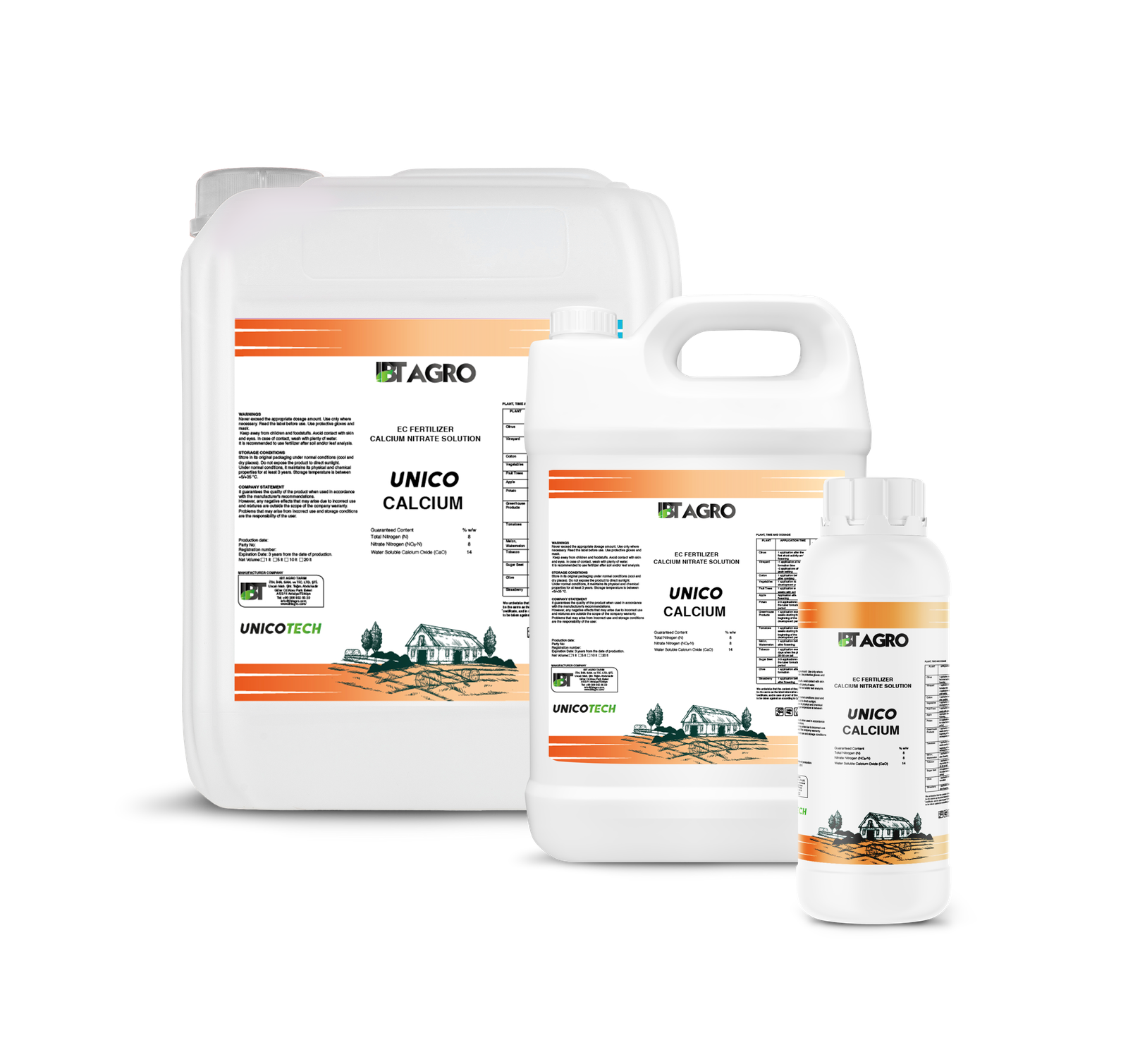Unico Calcium
PLANT, APPLICATION TIME & METHOD
|
PLANT |
APPLICATION TIME |
APPLICATION METHOD/DOSAGE cc/100 lt water |
|
Citrus |
1 application after the first shoot activity and flowering |
Leaf Application: 400-500 |
|
Vineyard |
-1 application at leaf formation time -2 applications after grain setting |
Leaf Application: 300-350 |
|
Cotton |
1 application before and after combing |
Leaf Application: 250-300 |
|
Vegetables |
1 application during the development period |
Leaf Application: 250-300 |
|
Fruit Trees |
1 application every 2 weeks with exile activity |
Leaf Application: 300-350 |
|
Apple |
Application after flowering |
Leaf Application: 400-500 |
|
Potato |
2-3 applications during the tuber formation period |
Leaf Application: 200-300 |
|
Greenhouse Products |
1 application every 2 weeks starting from the beginning of the development period |
Leaf Application: 350-400 Dripping: 1-1,5 lt/da |
|
Tomatoes |
1 application every 2 weeks starting from the beginning of the development period |
Dripping: 400-500 |
|
Melon, Watermelon |
1 application before and after flowering |
Dripping:300-350 |
|
Tobacco |
1 application every 15 days when the plants are 25-30 cm tall |
Dripping: 250-300 |
|
Sugar Beet |
2-3 applications during the tuber formation period |
Leaf Application: 200-300
|
|
Olive |
1 application after fruit formation |
Leaf Application: 150-200
|
|
Strawberry |
1 application before and after flowering |
Dripping: 350-400 cc/da |
Unico Calcium solution offers several benefits to plants, primarily due to its contribution of calcium and nitrogen.
Calcium Supply: Cell Wall Structure: Calcium is an essential component of plant cell walls. It strengthens cell walls, providing structural support to the plant. This is crucial for the overall integrity and rigidity of plant cells.
Nutrient Uptake and Transport: Facilitates Nutrient Absorption: Calcium plays a role in the uptake and transport of other nutrients. It helps in the movement of other essential elements within the plant, ensuring proper nutrient distribution.
Prevention of Disorders: Blossom-End Rot: Adequate calcium levels can help prevent disorders like blossom-end rot in tomatoes and peppers. This condition is characterized by the decay of the blossom end of developing fruits.
Cell Division and Growth: Cell Division: Calcium is involved in cell division and elongation. It promotes healthy growth in roots, shoots, and leaves.
Nitrogen Source: Nitrogen Supply: Calcium Nitrate also serves as a source of nitrogen, which is a vital nutrient for plant growth. Nitrogen is a key component of amino acids, proteins, and chlorophyll.
Acidic Soil Amendment: pH Regulation: In addition to calcium and nitrogen, Calcium Nitrate can help in regulating soil pH. It can be used as an amendment in acidic soils, helping to raise the pH to more suitable levels for plant growth.
Improved Plant Health: Resistance to Stress: Adequate calcium levels contribute to stress resistance in plants. It helps plants cope with environmental stressors such as drought, salinity, and temperature fluctuations.
Enhanced Fruit Quality: Fruit Firmness: Calcium is particularly important for fruits’ firmness and quality. It can reduce the incidence of softening and spoilage during storage.
Foliage Health and Leaf Health: Calcium supports the health of leaves, reducing the risk of disorders like tip burn and leaf necrosis.
Overall Plant Vigor and Productivity: The combined effects of calcium and nitrogen contribute to overall plant vigor, leading to improved productivity and yield.
Unico Calcium is produced to meet the calcium (Ca) needs of plants and is slightly fortified with amino acids to facilitate easy absorption by the plant. It prevents calcium deficiency in fruits while thickening cell walls to ensure firmness.
It’s important to apply Calcium Nitrate solution judiciously, considering the specific needs of the plants, soil conditions, and the growth stage of the crops. Proper application can result in healthier, more robust plants and improved crop quality.


